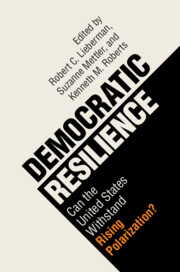Book contents
- Democratic Resilience
- Democratic Resilience
- Copyright page
- Dedication
- Contents
- Figures
- Tables
- Contributors
- Acknowledgments
- Part I Why Might Polarization Harm Democracy?
- Part II Political Institutions in Polarized Times
- Part III Social Polarization and Partisanship
- 7 The Social Roots, Risks, and Rewards of Mass Polarization
- 8 The Great White Hope
- 9 The Religious Sort
- 10 Weaponized Group Identities and the Health of Democracy
- Part IV Vicious Circles? The Relationship between Polarized Behavior and Institutions
- Part V Can Political Action Save Democracy in Polarized Times?
- Index
7 - The Social Roots, Risks, and Rewards of Mass Polarization
from Part III - Social Polarization and Partisanship
Published online by Cambridge University Press: 20 November 2021
- Democratic Resilience
- Democratic Resilience
- Copyright page
- Dedication
- Contents
- Figures
- Tables
- Contributors
- Acknowledgments
- Part I Why Might Polarization Harm Democracy?
- Part II Political Institutions in Polarized Times
- Part III Social Polarization and Partisanship
- 7 The Social Roots, Risks, and Rewards of Mass Polarization
- 8 The Great White Hope
- 9 The Religious Sort
- 10 Weaponized Group Identities and the Health of Democracy
- Part IV Vicious Circles? The Relationship between Polarized Behavior and Institutions
- Part V Can Political Action Save Democracy in Polarized Times?
- Index
Summary
In this essay we review the recent history of “social sorting” in American politics. We describe how partisan identities have grown increasingly aligned with other social identities such as race, religion, ideological identity, region, and culture. We connect this phenomenon with research from social psychology and comparative politics on the psychological and sociological effects of this type of identity sorting. In particular, well-aligned identities increase intolerance of political and social outgroups, and societies politically divided along ethnic and/or religious lines are at greater risk of descending into civil war. In fact, early American political scientists suggested that the unique stability of American democracy lay in the cross-cutting (unaligned) nature of American political and social identities. We build on these theoretical connections with new findings from our own research on the depths of partisan animosity in the U.S. today. We find that Democrats and Republicans vilify their partisan opponents in the strongest terms, they feel less negatively when those opponents physically suffer, and a small minority advocate outright violence against them. We situate those modern hostilities in a broader American historical context. Finally, we discuss the normative implications of these findings. The obvious negative implications extend to the risk of widespread civil unrest and escalating political violence. One positive implication emerges, however. Under the current partisan alignment of racial and religious identities, the overwhelming divide between the parties is between traditionally high-status (e.g. white, Christian) and traditionally marginalized (e.g. non-white, non-Christian) groups. This provides unprecedented power to previously marginalized groups – an entire political party pressing for their advancement. The social unrest that we currently see can therefore either be seen as the path toward violent division, or as a step toward an inherently disruptive movement toward social justice.
Keywords
- Type
- Chapter
- Information
- Democratic ResilienceCan the United States Withstand Rising Polarization?, pp. 171 - 194Publisher: Cambridge University PressPrint publication year: 2021



